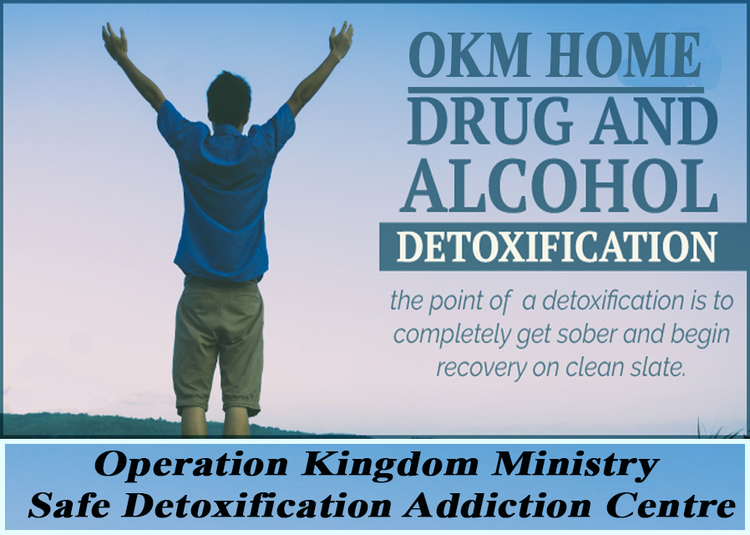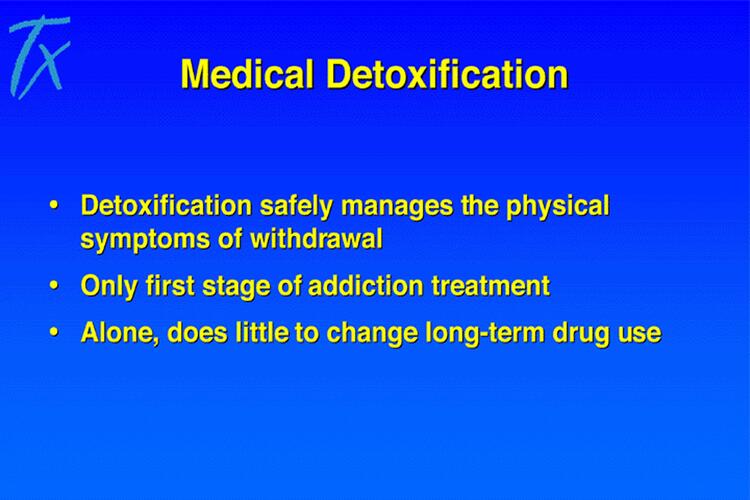

Medical detoxification safely manages the acute physical symptoms of withdrawal associated with stopping drug use.

However, medical detoxification is only the first stage of addiction treatment and by itself does little to change long-term drug use. Although detoxification alone is rarely sufficient to help addicts achieve long-term abstinence, for some individuals it is a strongly indicated precursor to effective drug addiction treatment.
Detoxification, also known as detox, is the process of reducing and eliminating drug or alcohol use and removing the addictive substance from the body. Detox from addiction can be done in an inpatient or outpatient setting, although it tends to be more effective when done in a residential treatment center. Detox alone is not enough to cure an addiction, and treatment with behavioral therapy and counseling is necessary for a true recovery from addiction.
Importance of Detoxing
Getting the existing drugs or alcohol out of your system is an important step to beginning treatment for addiction. Many drugs remain in the system for days or weeks after the last use. Detoxification can be an uncomfortable process because the body often exhibits withdrawal symptoms as it gets used to not having the drug available anymore. In some cases, these withdrawal symptoms can be dangerous. In some cases, withdrawal can cause seizures or a stroke. Most alcohol and drug treatment programs that include detoxification require that the patient be under the care of a qualified medical professional during the detox process. Being monitored by a physician also ensures compliance with the detoxification and treatment program.
Drug Detox
The specific details of a drug detox program depend on the specific drug that the user is addicted to. In most cases, the actual detoxification process takes only a few days to a week to complete.

With some drugs, the drug may be tapered off slowly over time so that withdrawal symptoms remain manageable. Drugs that are short acting tend to produce stronger but shorter-lasting withdrawal symptoms. The detox process for other drugs may require administration of medication, such as methadone for heroin addicts. These medicines act as a substitute for the original drug and the user must be weaned from the substitute drug once the initial addiction is broken. Some people never completely wean from the substitute drug and continue to take low maintenance doses for the rest of their lives. According to Harvard Health Publications, about 25 percent of people who use methadone to halt a heroin addiction continue to use it indefinitely, while another 25 percent eventually wean completely off the drug. The remainder of people using methadone go on and off the drug multiple times.
Alcohol Detox
Detoxification from alcohol is typically not as intensive as detox from highly addictive drugs such as heroin, cocaine, and prescription narcotics. According to the University of Maryland Medical Center, most alcoholics require four to seven days to completely detoxify from alcohol. During detox, the patient may experience nausea, shaking, sweatiness, and anxiety as withdrawal symptoms. Benzodiazepines, a family of tranquilizer drugs, may be used to help with alcohol withdrawal symptoms. However, patients can become addicted to these treatment drugs, so it is not an ideal solution. Anticonvulsants can also help recovering alcoholics handle withdrawal symptoms. Other drugs may be prescribed after detox in order to help the alcoholic from relapsing.
After Detox
After completing a detox program, the recovering addict still needs to go through treatment to complete his or her recovery. Therapy and group support programs are usually necessary to help the patient develop methods of dealing with problems and temptation without resorting to drug use. This therapy and support can be accomplished in a residential treatment clinic or through outpatient services.

Another aspect of treatment after detox is the administration of blood tests by a doctor to make sure that you are staying clean. Without follow-up treatment, detoxification is unlikely to cause any permanent changes and the user is likely to relapse soon after the initial detox. However, participation in a treatment program can vastly improve the odds that the detoxification will lead to a permanent cessation of drug use.
